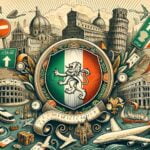Are you a UK resident looking to explore the stunning beauty and rich cultural heritage of Italy? Whether you’re drawn to the historic charm of Rome, the scenic vistas of Tuscany, or the romantic allure of Venice, traveling from the UK to Italy promises an unforgettable experience.
In this article, we will delve into the specific requirements, guidelines, and recommendations for UK travelers embarking on a journey to Italy. From entry requirements to transportation options and cultural etiquette, we’ll cover everything you need to know for a smooth and enriching travel experience.
Italy has long been a beloved destination for travelers from around the world, offering a diverse array of experiences that cater to every interest. From its delectable cuisine and fine wines to its iconic landmarks and vibrant art scene, Italy is truly a treasure trove waiting to be explored.
With recent changes due to COVID-19 and evolving travel regulations, it’s essential for UK travelers to stay informed about the rules and guidelines for visiting Italy during these unprecedented times.
In this comprehensive guide, we’ll provide valuable insights into entry requirements, COVID-19 guidelines, transportation options, accommodation tips, cultural etiquette, must-see destinations, and practical advice for navigating your way through Italy as a UK traveler. Whether you’re planning a leisurely vacation or an immersive cultural journey, this article will serve as your go-to resource for making the most of your travel from the UK to enchanting Italy.
Entry Requirements
When planning a trip from the UK to Italy, it’s important for travelers to understand the specific entry requirements and visa regulations. Here are some key points to keep in mind:
1. Passport: All UK citizens traveling to Italy must have a valid passport. The passport should be valid for at least three months beyond the planned date of departure from Italy.
2. Visa Requirements: For short stays of up to 90 days within a 180-day period, UK citizens do not need a visa to visit Italy for tourism, business, or family visits. However, if you plan on staying longer or for other purposes such as work or study, you may need to apply for a visa.
3. Travel Insurance: While not a specific entry requirement, it’s highly recommended for UK travelers to Italy to have travel insurance that covers medical expenses and emergencies during their stay in Italy.
In addition to these main requirements, travelers should also be prepared with any necessary documentation related to their accommodation bookings, return travel tickets, and proof of sufficient funds for their stay in Italy.
Overall, staying updated with the latest travel advisories and entry requirements is essential when planning your trip from the UK to Italy.
COVID-19 Guidelines
The travel from the UK to Italy during the COVID-19 pandemic requires a thorough understanding of the health and safety protocols set forth by both countries. As of September 2021, travelers entering Italy from the UK are subject to specific requirements to ensure the safety of the local population and mitigate the spread of the virus. It is essential for UK travelers to stay informed about these guidelines before embarking on their journey to Italy.
One of the primary requirements for travel from the UK to Italy is proof of vaccination against COVID-19. Travelers must present a valid vaccination certificate that demonstrates full vaccination with a European Medicines Agency (EMA) approved vaccine. Additionally, all individuals entering Italy from the UK are required to fill out a digital Passenger Locator Form (dPLF) prior to their arrival. This form provides contact details and information about their stay in Italy, including any recent travel history.
Upon arrival in Italy, travelers from the UK may be subject to health screenings at airports or other points of entry. Depending on their vaccination status and recent travel history, individuals may be required to undergo COVID-19 testing or quarantine measures as determined by Italian health authorities. It is crucial for UK travelers to stay updated on these guidelines, as they are subject to change based on evolving global health conditions and government regulations.
As the situation surrounding COVID-19 continues to develop, it is important for UK travelers planning a trip to Italy to monitor official sources of information, such as government websites and embassy advisories, for the latest updates on travel restrictions and health protocols.
| Travel From Uk to Italy Rules | COVID-19 Guidelines |
|---|---|
| Proof of Vaccination | Valid vaccination certificate with EMA-approved vaccine |
| Passenger Locator Form | Digital form providing contact details and travel information |
| Health Screenings | Possible testing or quarantine upon arrival in Italy |
Transportation Options
When it comes to traveling from the UK to Italy, there are several transportation options available for UK travelers. Whether you prefer the speed and convenience of air travel, the scenic and leisurely journey aboard a ferry, or the classic European experience of traveling by train, each mode of transportation offers its own unique advantages.
For those seeking a quick and direct route, flying from the UK to Italy is often the preferred choice. With several major airports in the UK offering direct flights to popular Italian cities such as Rome, Milan, Venice, and Florence, travelers can easily find convenient and affordable flight options. Many airlines offer regular scheduled flights between the UK and Italy, making air travel a convenient choice for those looking to minimize travel time.
Another popular option for traveling from the UK to Italy is by ferry. Several ferry companies operate routes between various ports in the UK, such as Dover or Southampton, and ports in Italy including Genoa or Civitavecchia. Traveling by ferry allows passengers to enjoy breathtaking views of the sea during their journey and provides an alternative experience compared to air travel.
For those who appreciate a more relaxed pace of travel and want to take in the picturesque European landscapes along the way, traveling by train is an excellent option. The Eurostar service offers high-speed rail connections from London to cities like Paris and Brussels, where travelers can then transfer onto connecting trains that will take them directly into Italy.
| Transportation Option | Advantages |
|---|---|
| Flights | Quick and direct travel; multiple airline options |
| Ferries | Breathtaking sea views; alternative travel experience |
| Trains | Picturesque landscapes; relaxed pace of travel |
Accommodation
When traveling from the UK to Italy, one of the key aspects to consider is finding suitable accommodations for your stay. Whether you prefer the luxury of a hotel, the coziness of a bed and breakfast, or the convenience of an apartment rental, Italy offers a wide range of options to suit every traveler’s needs and preferences.
Types of Accommodations
Italy provides various types of accommodations for travelers from the UK, including hotels, bed and breakfasts (B&Bs), vacation rentals, hostels, and agriturismo (farmhouse stays). Each option offers distinct experiences and amenities, allowing visitors to choose based on their budget and travel style.
Booking Tips
When booking accommodations in Italy as a traveler from the UK, it’s advisable to do thorough research and make reservations well in advance. Popular tourist destinations such as Rome, Florence, Venice, and Amalfi Coast can get quite busy during peak seasons, so securing your lodging early ensures you have a comfortable place to stay.
Recommendations
For UK travelers visiting Italy for the first time, some recommended areas to consider for accommodations include Tuscany for its scenic countryside villas and historic charm; Amalfi Coast for its stunning coastal views; Sicily for its cultural richness; and Lake Como for its peaceful lakeside retreats. Additionally, major cities like Rome and Milan offer a mix of modern conveniences and historic landmarks in close proximity to many accommodation options.
Whether you’re looking for a bustling urban experience or a tranquil countryside getaway, Italy has something to offer every UK traveler.
Cultural Etiquette
Italy is known for its rich cultural heritage, and as a traveler from the UK, it’s essential to understand and respect the cultural norms and practices of the country. By familiarizing yourself with Italian customs, you can ensure a smooth and respectful travel experience while visiting this beautiful destination.
Greetings and Gestures
In Italy, greetings are an important part of social interaction. When meeting someone for the first time, a handshake is customary. It’s also common for friends and family to greet each other with a kiss on the cheek. Additionally, gestures play a significant role in Italian communication. For example, using hand gestures while speaking is quite common and can help convey emotions or emphasize points in conversations.
Dining Etiquette
Italian meals are a social affair, and dining etiquette is an essential part of the culture. When dining in Italy, it’s important to remember that Italians take their food seriously. It’s considered impolite to ask for any variations or substitutions to dishes on the menu. Additionally, it’s customary to wait for everyone at the table to be served before beginning your meal, as well as keeping your hands above the table at all times.
Dress Code
Italians are known for their impeccable sense of style, and dressing appropriately is important when visiting Italy. In more formal settings such as restaurants or religious sites, modest attire is expected. It’s best to avoid wearing beachwear or clothing that could be considered too casual when exploring public spaces or participating in cultural activities.
By being mindful of these cultural norms and practices in Italy, UK travelers can show respect for the local customs and enhance their overall travel experience in this captivating country. Understanding Italian culture will not only help travelers navigate social interactions but also gain a deeper appreciation for this remarkable destination.
Must-See Destinations
Italy is a country rich in history, culture, and natural beauty, making it an ideal destination for travelers from the UK. Whether you’re a history buff, a foodie, or simply looking to soak up the Mediterranean sun, Italy has something to offer for everyone. Here are some must-see destinations that should be on every UK traveler’s itinerary when visiting Italy:
- Rome: Known as the “Eternal City,” Rome is home to iconic landmarks such as the Colosseum, the Pantheon, and the Vatican City. Visitors can immerse themselves in the city’s ancient history while enjoying delectable Italian cuisine and vibrant street life.
- Florence: The birthplace of the Renaissance, Florence is a treasure trove of art and architecture. The Uffizi Gallery, the Duomo, and Ponte Vecchio are just a few of the city’s must-see attractions that showcase its cultural heritage.
- Venice: With its unique network of canals and stunning palaces, Venice is a romantic and enchanting destination. A gondola ride along the Grand Canal and visits to St. Mark’s Square and Doge’s Palace are essential experiences for any traveler.
When traveling from the UK to Italy, it’s important to plan ahead and prioritize which destinations align with your interests and preferences. Each city offers its own distinct charm and character, allowing visitors to experience the diverse facets of Italian culture.
Whether you’re drawn to Italy’s historic landmarks or its picturesque landscapes, each destination promises an unforgettable experience that will leave a lasting impression on UK travelers. From ancient ruins to Renaissance masterpieces, Italy invites exploration and discovery at every turn.
Practical Tips
In conclusion, traveling from the UK to Italy offers a wealth of opportunities for exploration and cultural immersion. As we have discussed, understanding the entry requirements, COVID-19 guidelines, transportation options, accommodation choices, cultural etiquette, and must-see destinations is crucial for an enriching travel experience. Additionally, practical tips such as currency exchange and language barriers can significantly enhance the overall journey.
While navigating the current COVID-19 guidelines for traveling from the UK to Italy may seem daunting, being well-informed about these protocols is essential for a safe and enjoyable trip. From pre-travel testing requirements to quarantine regulations upon arrival, staying updated on these guidelines can make a significant difference in ensuring a smooth travel experience.
Furthermore, being mindful of cultural norms and practices in Italy will not only foster respect for the local customs but also contribute to meaningful interactions with locals. Whether it’s trying out some basic Italian phrases or adapting to dining etiquettes, embracing these cultural differences can elevate the overall travel experience.
Overall, embarking on a trip from the UK to Italy offers an exciting opportunity to explore remarkable destinations and create lasting memories. By staying informed and prepared before departing, travelers can maximize their enjoyment while minimizing any potential hurdles along the way.
Frequently Asked Questions
What Do British Citizens Need to Enter Italy?
British citizens need a valid passport to enter Italy. As of now, they do not require a visa for short stays in the country, but this may change after Brexit.
Are There Any Covid Restrictions for Italy?
Yes, Italy has implemented Covid restrictions to curb the spread of the virus. These include mandatory mask-wearing in indoor public spaces, social distancing measures, and limits on gatherings both indoors and outdoors.
What Documents Are Needed to Go to Italy?
To go to Italy, British citizens will need a valid passport with at least 3 months validity beyond their planned stay. Depending on the length and purpose of their visit, they may also require a visa or other documents such as proof of accommodation or return tickets.

I’m a passionate traveler, writer, and Italophile. My fascination with Italy’s history, art, and culture has led me on countless adventures across the Italian landscape. Through “I Live Italy,” I share my love for this extraordinary country and aims to inspire others to explore its boundless beauty.





